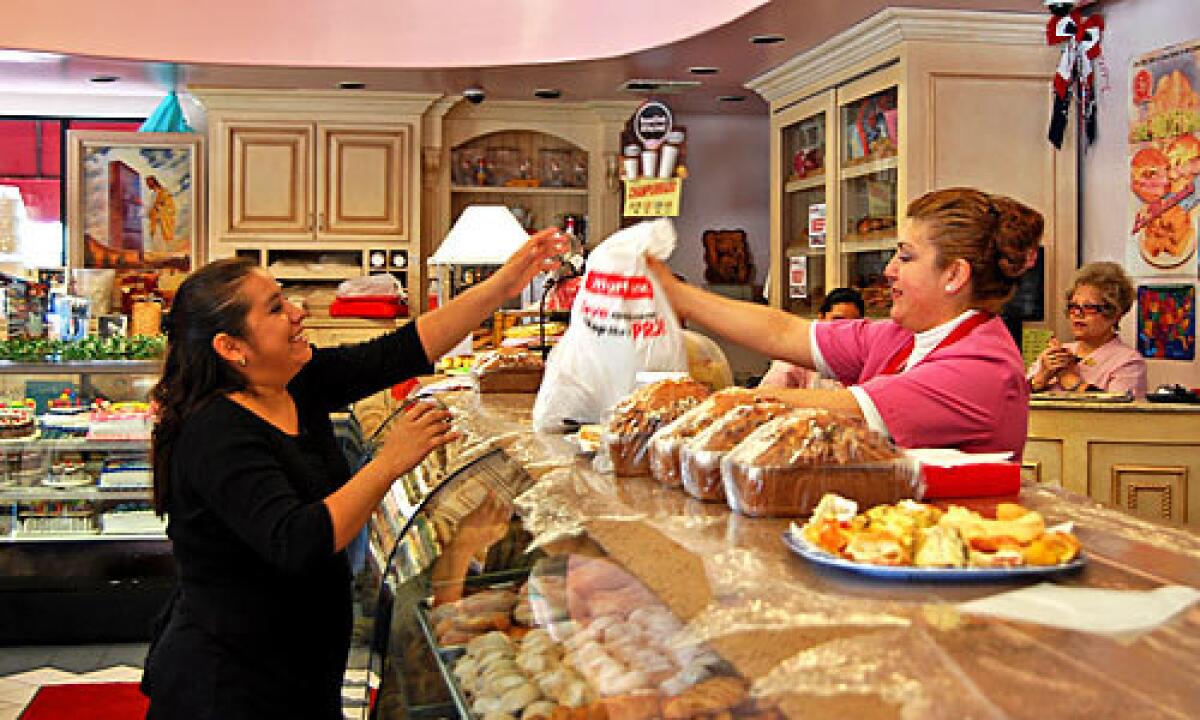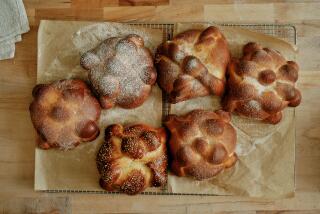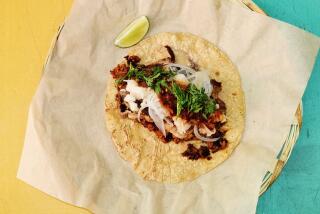La Mascota Bakery: a Boyle Heights tradition

As the early Wednesday morning rush ends for champurrado, the cinnamon-scented hot Mexican chocolate thickened with masa harina, Rosina Valencia slips behind the semicircular enclave that conceals her desk. She readjusts her fuchsia snap-front work shirt and settles in to confirm wholesale bolillo orders from neighboring restaurants as an employee transfers dozens of the palm-sized loaves, still warm from the oven, to the display case.
“Two bolillos and just one croissant this time -- I’m on a diet -- one of those big chocolate chip cookies too,” says 55-year-old Richard Vasquez, a La Mascota customer for as long as he can remember.
Lucy Garcia, a veteran employee of the Boyle Heights bakery, hands over a white paper sack already freckled with opaque butter stains from the pastries inside. Vasquez fishes around and pulls out a crusty bolillo, the Mexican equivalent of a baguette, only chubbier and with a chewier, pleasantly salty crust, and tears off a bite.
“We try to keep things the way Papá wanted them,” says Rosina Valencia, co-owner of La Mascota Bakery, from her raised perch.
Papá, Ygnacio Salcedo, opened La Mascota Bakery on a sleepy little street in Boyle Heights in 1952. Seven years later, he moved the bakery to its current location, where it has stood for the last 50 years, a few doors down on the same street that today is the bustling thoroughfare of Whittier Boulevard.
“There were no bakeries nearby, so Papá thought he’d give it a try,” Valencia says as another customer helps himself to a generous slice of golden-brown sour cream coffee cake sprinkled with toasted sesame seeds called quesadilla Salvadoreña. He pauses mid-bite, trying to place the flavor.
“It’s Parmesan, not too much, not too much sugar -- the way they make it in El Salvador,” Valencia explains as the customer polishes off the last bite.
Papá Salcedo grew up in Mascota, a small town in the western Mexican state of Jalisco, shortly after the Mexican Revolution. He apprenticed in a bakery as a young boy and by 17 owned his own panadería.
But his hometown career would be short-lived. In 1927, shortly after a series of Catholic counterrevolutions against the Mexican government escalated into the Cristero War, rebels stormed the bakery and killed several of Salcedo’s bakers and customers. He fled to Los Angeles the following year.
Generations
“Cuatro cincuenta,” Garcia says, looking up from the calculator covered in plastic wrap. An elderly woman hands over $4.50 and takes the sack of guava libros (“books” of strudel-like pastry filled with jam) and delicate sugar-dusted cuellos (“collars” of glazed flaky pastry) to one of the wobbly iron patio tables in the corner. She nibbles the cuello slowly, from the outside in.
“Many of our customers we’ve known for generations,” says Rose Salcedo, Valencia’s sister-in-law, who also works the front counter. When Papá died in 2002, ownership of the bakery passed to Valencia and her brothers Edward, Ygnacio Jr. (Rose’s husband) and Victor.
Ygnacio Jr. and his brother Edward work the night shift making the bolillos and dozens of assorted pan dulce (Mexican sweet breads), pastries and cookies. Neomi Salcedo, the 39-year-old daughter of Ygnacio Jr. and Rose, is the resident birthday and quinceañera cake decorator; their son Ygnacio III is also a staff baker. Valencia and her younger brother Victor arrive in the morning, the air still sweet with fermenting yeast, to manage business operations and supervise the day staff.
“The tamales were Mamá’s contribution,” Valencia says, nodding toward an enclosed kitchen opposite the front door where three women are spooning spicy red chile and pork filling onto masa-lined corn husks.
Old standards
In 2000, the siblings purchased a small retail shop next to the bakery to house the larger tamale kitchen and expand the bakery’s offerings beyond traditional Mexican pastries. Neomi, a culinary school graduate, added candied apples drenched in caramel sauce and vanilla-scented cupcakes crowned with buttercream to the menu; Ignacio III introduced the rustic fruit and chocolate swirled poundcakes. But the family still considers their father and grandfather’s bolillos the bakery’s calling card.
Before opening the bakery, Ygnacio Salcedo worked as a dishwasher at the Ambassador, the landmark Mid-Wilshire hotel that was recently demolished. When a French guest bemoaned the quality of the bread, Salcedo offered to make the Mexican rolls.
“They were always Papá’s specialty,” Valencia says, inspecting the stack of plastic-wrapped tortas, the traditional Mexican bolillo sandwiches stuffed with sliced meats, carne asada (grilled flank steak) or spicy chorizo sausage, waiting for the lunch crowd.
A couple of teenagers in low-slung jeans and white sneakers have dropped by for an after-school snack. “Those free?” asks one of the boys, nodding toward discounted bags of day-old pastries piled on a rolling metal cart. They lean against the glass counter, taking in the dozens of galletas (cookies), and finally settle on a half-dozen rainbow-colored pressed butter cookies shaped like wreaths and four-leaf clovers.
“The hardest part is seeing the neighborhood kids grow up so fast,” Rose says.
“And finding time off to spend with the family,” her sister-in-law adds from her perch. The bakery is open daily, save for a handful of holidays and two weeks in August.
“Papá always liked to say, ‘The sun rises for everyone, you just have to work hard to make it happen,” Valencia continues. “And you do have to get along with all the in-laws and out-laws to work here, that’s for sure.”
More to Read
Eat your way across L.A.
Get our weekly Tasting Notes newsletter for reviews, news and more.
You may occasionally receive promotional content from the Los Angeles Times.










